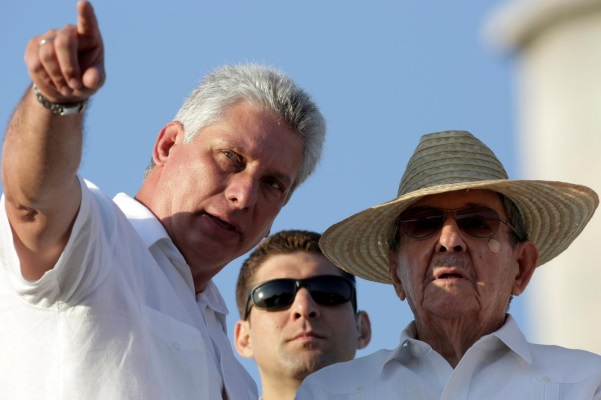
Cubanet, Luis Cino Alvarez, 24 August 2017 — In his hardline speech to Cuban Communist Party (PCC) cadres, Vice President Miguel Díaz-Canel killed any illusions some may have harbored that a future government headed by him, following Raúl Castro’s retirement,* would tend towards reforms and be less authoritarian and repressive.
Assuming the stance of a prison warden and speaking in a more commanding voice than usual, Díaz-Canel came across as considerably menacing–and not only with respect to the open opposition. Into the same bag of what he called “subversive projects” and “counterrevolution” Díaz-Canel also tossed the loyal oppositionists of Cuba Posible, the pro-government journalists who collaborate on non-state media, centrists and other ideologically diverse actors–no matter if they declare themselves to be within the Revolution.** As if this were not enough, he also warned that there would be no consolidations of a private sector that could break away from the State and turn into an agent of change.
All of this in a tone that more reminiscent of a State Security official than of a technocrat of the party bureaucracy. So intransigent and backward did Díaz-Canel come across, that in his place could have stood the uncouth Ramiro Valdés, or Machado Ventura himself were he not so busy cleaning up agricultural disasters.
If a medium as mild in its treatment of the regime as OnCuba Magazine irritates Díaz-Canel, we can only imagine what he thinks of Cubanet and Martí Noticias, among others, and what he has in store for independent journalists.
Could it be that the heir apparent, if he wants to make it to February 2018, could not spare any harshness in his lecture? How could he disappoint the little old commie fanatics who keep the fuse lit, even at the risk of it all exploding in their hands?
There is no need to dig deep and expect surprises from Díaz-Canel. For now, he called the play and it truly sets my teeth on edge. It is more of the same. Without much variation in the score.
There was no reason to expect otherwise–why insist on sniffing out a Gorbachev or Deng Xiao Ping in Díaz-Canel? He must have learned in cadre school that this type of system does not allow reforms that do not come apart at the seams; that rats, regardless of how they might beg for it, cannot be fed cheese, because then they will want water, and then more cheese, and will continue begging for it until the pantry runs out.
Actually, it was only the usual naifs, those given to wishful thinking, the extreme optimists, who harbored illusions about Díaz-Canel. He might have been able to appear liberal with the gays and rock fans of the Club Mejunje in his native Santa Clara, back when he had not yet put on weight, would ride his bicycle, and looked like Richard Gere. But once he got to Holguín as first provincial secretary of the PCC, he did not hesitate to order evacuations of marginal neighborhoods: apparently he preferred the invasive marabú* weed to squatters.
Starting now, he is giving advance notice, as if he were just another general–and of the praetorian kind–that he wants a calm and orderly classroom, and that he will not balk at ordering State Security (after seeing to the extinction of the dissident movement) to take care of the insubordinate, lackadaisical and diversionist elements. And it could be that later on, given his inclination to social media, he will tweet–cock of the walk that he is–that “there is no reason to make the least concession to the Yankee imperialists.”
Díaz-Canel is of a younger generation, but as in his school days, he remains disciplined, a follower of orders. And very attentive to what his preservation instinct dictates. Apparently it has not failed him yet. It is no accident that he has gotten to where he is today.
Translator’s Notes:
*In 2013, Raúl Castro told the Assembly of People’s Power (the Cuban Parliament), that he will retire from the presidency of the Council of State and the Council of Ministers on Feb. 24, 2018. At the time of that announcement, Díaz-Canel was promoted to first vice-president of both councils.
**A reference to Fidel Castro’s Words to the Intellectuals speech of June 30, 1961, in which he set limits to the free expression of artists and writers: “Within the Revolution, everything; outside the Revolution, nothing.”
Translated By: Alicia Barraqué Ellison
